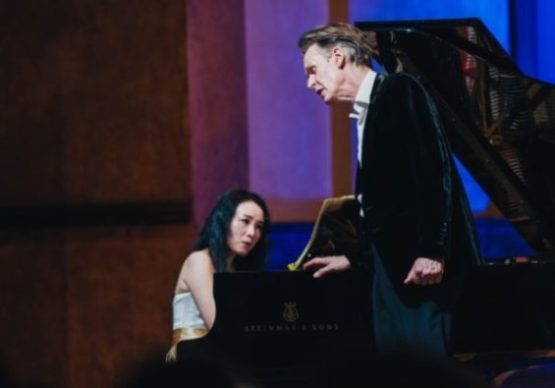 United States Schubert, Winterreise: Ian Bostridge (tenor), Wenwen Du (piano). San Francisco Performances, Herbst Theatre, San Francisco, 21.10.2023. (HS)
United States Schubert, Winterreise: Ian Bostridge (tenor), Wenwen Du (piano). San Francisco Performances, Herbst Theatre, San Francisco, 21.10.2023. (HS)

Renowned English tenor Ian Bostridge knows his way around Schubert’s Winterreise, perhaps better than any lieder singer extant. He has recorded the 24-song masterpiece of vocal writing three times. His 2004 recording with the brilliant pianist Leif-Ove Andsnes set a high standard, and the 2015 live performance in Wigmore Hall with composer and pianist Thomas Adès raised the bar higher. Each recording reflected a freer, deeper understanding of what the words and music signify.
Bostridge ambled slowly onto the Herbst Theatre stage in his San Francisco Performances recital, a roomy dark sport coat over a plain open-collared white shirt, his shoulders a bit stooped. It was clear that he was getting into the role of a vagabond making his way through a cold winter in the wake of a lost love. That, after all, is the setting for the piece, and Bostridge mustered all his weapons as singer and opera actor to invest this Everest of lieder with as much context as he could.
The extraordinary Canadian pianist Wenwen Du was in remarkable sync with Bostridge, and the music unfolded with unity and balance. Piano flourishes seemed to inspire improvisation from the singer and vice versa: unexpected nuances from the singer immediately shaded the piano part. This was lieder at a high level.
Bostridge’s lyric tenor can reach nonchalantly for a high-lying phrase, so most of the music’s wide-ranging tessitura rests comfortably in his voice. His lower notes have picked up more of a baritone quality in recent years, except for a few, very low phrases. Passages below the staff usually sounded strong, which is important in several key places.
There is a tradeoff, however, between the clear and pure character of Bostridge’s voice and the shambling figure he portrayed – head often down, his body leaning at tortured angles to the piano, his slumping mien signifying the narrator’s growing fatigue. I often wondered why he was singing to the floor and not to us in the audience.
Not until the final song, ‘Der Leiermann’ (The organ grinder), did he stand up straight, and the clarity of his voice and all its shadings finally came completely into focus. It was a stunningly apt effect. That song, after all, comes as a sort of afterthought, an epilogue offered by a different character than the one with whom we have just taken the long journey (or at least a different version of him).
Bostridge set out in the first few songs with a tone of weariness, not so much in tempo – Wu’s accompaniment moved along at a decent pace – but in vocal affect. Perhaps the increasing fatigue of our protagonist might have needed less physical acting if things did not start so down-in-the-dumps, but that is how Bostridge wanted us to feel. He shaped an arc through the first few songs about locations that call to mind the lost love.
With the matter-of-fact style to the opening song, ‘Gute Nacht’ (Good night), Bostridge’s vocal nuances underlined key phrases and conveyed extra depth to the meanings of the text. Finally, at ‘Irrlicht’ (Will-o’-the-wisp), he struck a different tone, as it veered away from an obsession with memories to an account of the present experience on the journey. This slow, almost dreamy music benefited from Bostridge’s ability to float long-limbed melody.
The next several songs were especially appealing, as Du’s insightful piano deftly commented on the songs’ descriptions. ‘Frühlingstraum’ (Dream of spring) was lovely, introducing a moment of hope after all that despair. Even the next one, ’Einsamkeit’ (Loneliness), conveyed a brief sense of positivity on the final line, ‘War ich so elend nicht’ (I was not so wretched). A lively ‘Die Post’ (The post), with the piano’s emulation of post-horn fanfares and galops, felt like it was settling into a sense of relief, and the piano’s emulation of barking dogs in ‘Im Dorfe’ (In the village) drew a smile.
By ‘Der Wegweiser’ (The signpost) Bostridge let us know there was no going back. His voice took on a cloak of barely concealed terror and reached a point of utter despair with the next song, ‘Das Wirsthaus’ (The inn – actually a graveyard). With the penultimate songs, ‘Mut!’ (Courage) and ‘Die Nebensonnen’ (Phantom suns), which are meant to suggest a more hopeful place, he maintained the same disheartened mode.
At this point Bostridge himself was dealing with an occasional discreet cough, but he powered through without incident and finished with that memorable ‘Leiermann’.
Any performance of Winterreise is an occasion, of course, especially from someone as obsessed with it as Bostridge, who even wrote a book about it. In it, he said every performance for him needed to differ in some way from what he might have done before. That sense of spontaneity made a dark turn in this performance. If the sad-sack portrayal took some of the nobility from the sheer vocal beauty of the music, it will not soon be forgotten.
Harvey Steiman
